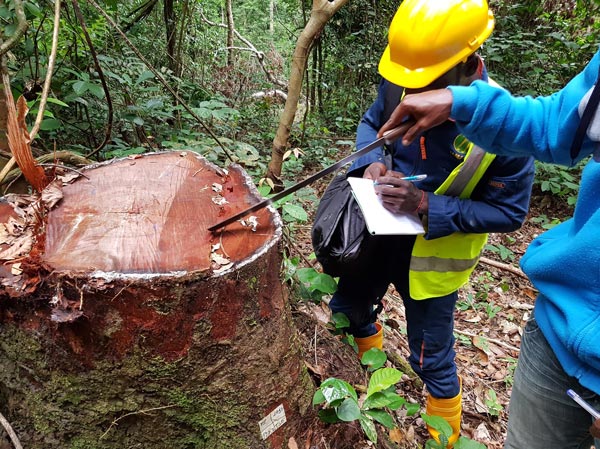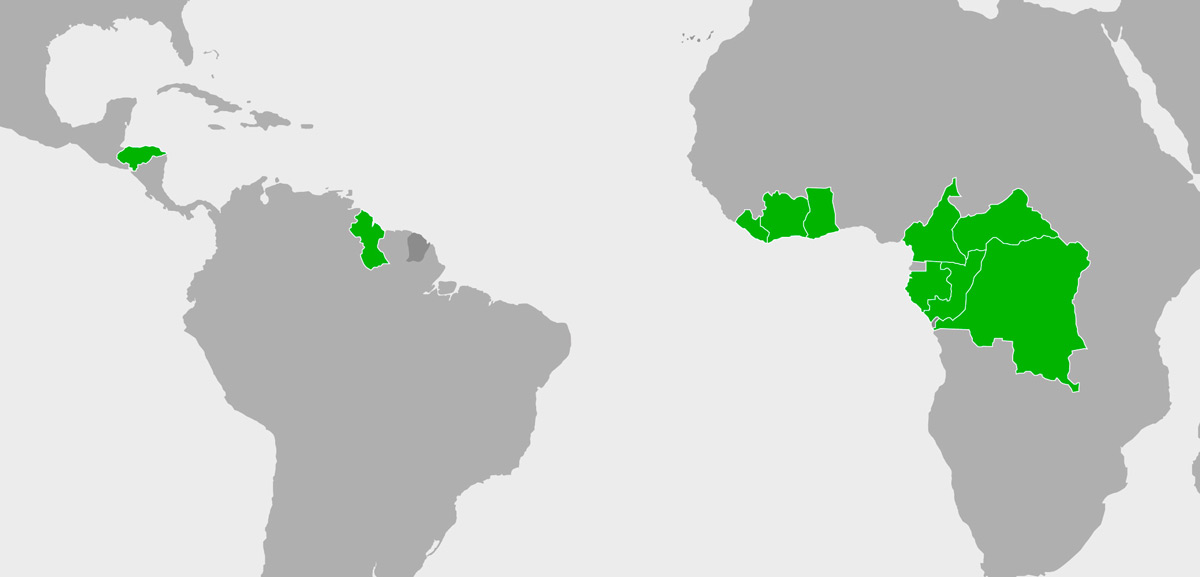VPA Africa - Latin America Facility (closed)
Illegal logging takes place when timber is harvested in violation of national laws. It causes severe damage to some of the world’s most valuable remaining forests and harms the people who depend on those forests for their livelihoods.
To address this problem, the European Union (EU) created the Forest Law Enforcement, Governance and Trade (FLEGT) Action Plan in 2003.

Our objective: Combating illegal logging through better forest governance
The VPA ALA Facility aims to enhance the sustainability and legality of forest sector activities in VPA countries and to strengthen awareness on the implementation of the EU FLEGT Action Plan. Through these goals, we support efforts aimed at improving forest governance and promoting responsible forest management and trade.
Our work: Promoting sustainable forest practices and raising awareness of the EU FLEGT Action Plan
From 2021 to 2025, EFI hosted the VPA Africa – Latin America Facility (ALA Facility) under a contract with the European Commission. The ALA Facility collaborated with a wide range of stakeholders to improve forest governance and address illegal logging and associated trade through Voluntary Partnership Agreements (VPAs) between the EU and timber producing countries.
Partners included Government institutions in countries from Africa (Republic of the Congo, Cameroon, Ghana, Liberia, Côte d’Ivoire, CAR and Gabon) and Latin America (Honduras, Guyana). Governments were responsible for negotiation and implementation of the VPAs, in close collaboration with the European Union. Local NGOs and industry associations active in forest governance were also involved.
The ALA Facility’s support focused on strengthening systems and capacity for VPA negotiations and implementation. It did this by facilitating bilateral dialogue through roadmaps and joint implementation frameworks, by supporting decision-making on critical steps in the process, and by informing improvements to national regulatory frameworks.
It also contributed to the design, development, and roll-out of timber legality assurance systems (TLAS), carried out analyses to support TLAS and FLEGT licensing schemes, and provided guidance and good practices on governance and monitoring. In addition, the Facility played an active role in joint communication efforts and promoted multi-stakeholder dialogue on VPAs.
Lessons learnt
The lessons from supporting implementation of the EU FLEGT Action Plan processes in the 15 countries that engaged in a VPA process are outlined below. These lessons are backed by studies, assessments, tools, and communication products developed during the period of the EU FLEGT Facility. These provide a compendium of resources that remain relevant to policymakers, practitioners, and stakeholders seeking to strengthen governance and assure legality in the forest sector.
- 1. Partnerships
- Equal partnership: Separating governance reform discussions from financial assistance fosters political dialogue instead of a donor–recipient dynamic, creating trust and deeper engagement.
- Consensus among partners: VPAs help align development partners and focus support on agreed priorities.
- Legally binding agreements enhance seriousness and commitment.
- Joint tools (plans, frameworks, stock-takes) are effective for setting priorities, tracking progress, and engaging stakeholders.
- 2. Trade & Markets
- Private sector dynamics: Private sector involvement brings new dynamics, broadens support for reform, and strengthens SME organisation.
- Supply-demand linkage: Linking supply and demand measures ensures governance improvements are matched by market incentives.
- Consumer markets: Consumer markets reinforce sustainable production by requiring legal sourcing.
- Global trade shifts: Shifts in timber trade highlight the need for a global response, as VPA countries now export more to Asia than to the EU.
- 3. Participation & Dialogue
- Stakeholder platforms provide visibility and pressure for change.
- National dialogue builds trust, exposes governance weaknesses, and fosters consensus on reforms.
- Sovereignty: legality focus supports national ownership, fair competition, and reforms tailored to each country.
- 4. Commitment & Anchoring
- Political will is critical – high-level engagement can accelerate or stall progress.
- Policy anchoring: Anchoring in national policies ensures VPAs are relevant and sustainable.
- Investment: Time and investment are essential for real participation, institutional capacity, and mindset change.
- 5. Governance Effects
- Transparency: Making information public and opening decision-making increases scrutiny.
- Accountability: Clarifying roles and empowering non-state actors strengthens oversight.
- 6. Timber Legality Assurance Systems
- Legal frameworks: Clear legal frameworks with defined rights and responsibilities are vital.
- Stakeholder inclusion: Inclusive stakeholder engagement ensures legitimacy and acceptance.
- Capacity building equips actors with skills for implementation and monitoring.
- Technology and data systems (GIS, remote sensing, blockchain) enhance traceability.
- Monitoring and enforcement require audits, inspections, and clear penalties.
Resources
For further information, visit the archived website of the VPA Africa – Latin America Facility.
The VPA Africa – Latin America Facility generated a wide range of knowledge, tools, and lessons during its work from 2021 to 2025. These resources remain useful for understanding how to promote good forest governance and strengthen legality assurance systems.
Contact: Tim Dawson
This webpage was produced with the financial assistance of the European Union. The contents of this page are the sole responsibility of the European Forest Institute and can under no circumstances be regarded as reflecting the position of the European Union.

